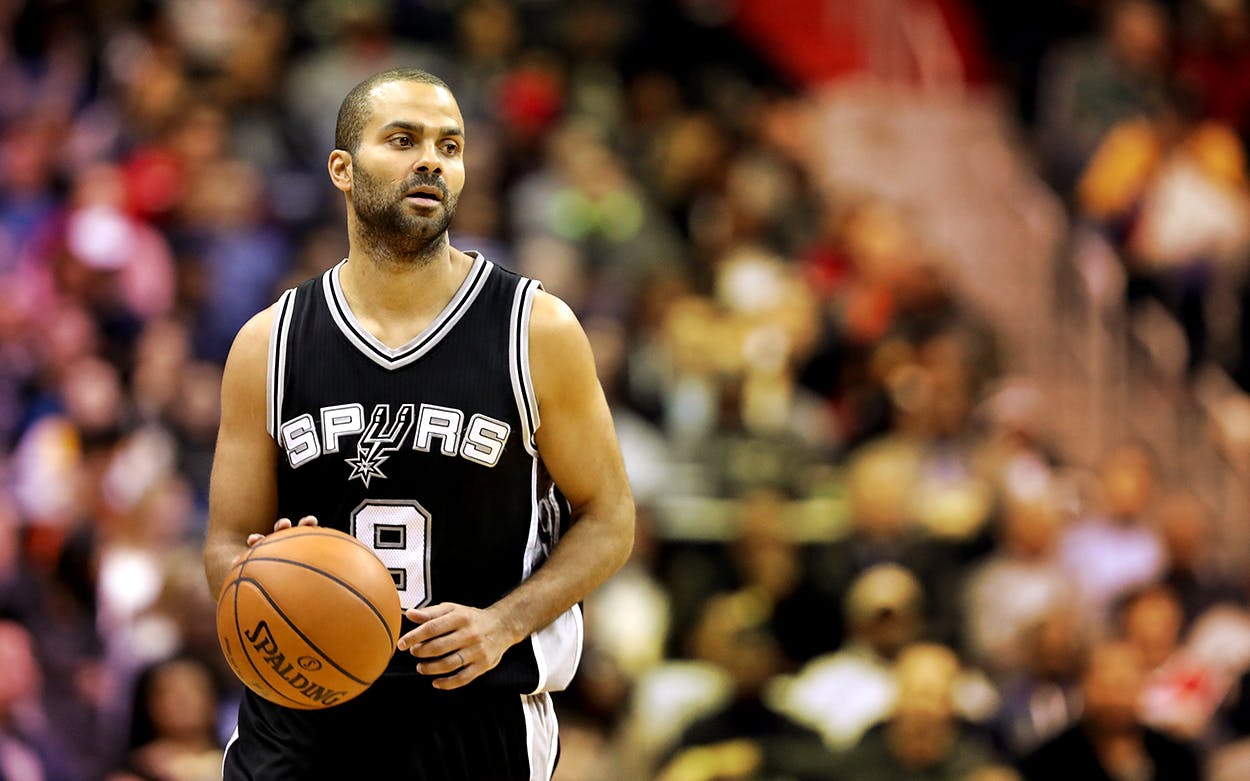You know those segments during NBA games where they cut to a player or a coach caught on a microphone? Generally they’re making meaningless comments, little asides like “Nice shot” or “Come on! We’ve got this”? The clip ends, the basketball restarts, and you never think about what was said ever again.
I’ve seen hundreds of those segments, but there’s only one that I’ve never been able to forget. It was the first thing I thought of when I heard that longtime San Antonio Spurs point guard Tony Parker is retiring after eighteen seasons. It happened in Miami during Game 3 of the 2014 NBA Finals. The series was tied 1-1, and LeBron James’s Heat hadn’t lost a playoff game at home that year. The Spurs came out hot, up by 25 at one point during the first half. They ended up winning by nineteen. Point guard Tony Parker scored just fourteen points with another four assists, both lower than his series average. Still, as the clock was winding down and Parker checked out of the game for the final time, the microphones picked up his conversation with head coach Gregg Popovich. Pop grabbed Parker’s shoulders and looked him in the eyes.
“Great leadership,” he said. “You didn’t get 30. It was great leadership and solid, solid play with the ball and your teammates. Great job.”
It was a classic Spurs moment, all the more memorable when compared to the flashy style of the Heat. What made it special, though, is the way it demonstrated how far Parker and Popovich had come in their relationship.
Parker is one of the greatest Spurs of all time, a pillar of the Big Three that brought San Antonio four titles. He is the 2007 Finals MVP, a six-time All-Star, and the Spurs’ all-time leader in assists. But when the team drafted him 28th overall in 2001, even his hometown press in France didn’t believe he would amount to much.
When he arrived in San Antonio, he had to bring coffee and donuts to every shootaround, those being the duties of a Spurs rookie. On the court, Popovich hollered and cursed at him. Allegedly, the legendary coach went hoarse at practices yelling at the 19-year-old, who was prone to turning the ball over and running the wrong plays. When the Spurs drafted Manu Ginobili the following year, Popovich realized quickly that the best way to coach the Argentinian shooting guard was to just get out of his way, but the coach continued to ride Parker. Even after Parker played a pivotal role in the 2003 Finals, the Spurs tried to sign star point guard Jason Kidd. When Parker objected, Popovich told him simply, “We’re doing it.”
Kidd ended up re-signing with the New Jersey Nets, and Parker remained at point guard for the Spurs. Three more banners followed from there, and eventually Popovich relented. He had no choice. On a team famous for its work ethic, Parker was the last one to leave the gym most days. He’d come to play so well and do so many things right, what was there to criticize?
Among Spurs fans, Parker never got as much respect as the all-time great Tim Duncan or as much love as Ginobili, who is so famously competitive that Kobe Bryant once called him “a motherf—–,” but Parker was every bit as important as those two. If Duncan was the face and Ginobili the heart of the franchise, then Parker was its brain. He made the whole thing work. After a few years in the league, when Parker would direct the team to run a different play than the one Popovich called for, the coach would just sit down and watch his team score another basket.
It’s hard to think of Parker without thinking of Duncan and Ginobili. They unlocked something inside of the point guard, as he did for both of them. Watching their former teammate Kawhi Leonard challenge a Golden State Warriors team that appears to be self-destructing in this year’s NBA Finals, it’s worth appreciating the miracle of what those three achieved in San Antonio. That a friendly giant from the Virgin Islands, a crooked-nosed Argentinian, and a lanky French point guard would be stars in the modern NBA is shocking enough. It’s even rarer that they made it last as long as they did. Talking through his decision to retire, Parker told the Undefeated, “Timmy and Manu are not playing. It’s not the same.”
Parker told his former teammates of his decision a few days ago, after the three met for a game of tennis. I don’t know if there’s a more perfect image of those three post-NBA—the three of them together, as close off the court as they are in our memories. When he left the Spurs after the 2018 playoffs to play last season for the Charlotte Hornets, Parker wrote a letter in the Players’ Tribune. “That’s also the beauty of basketball, and of life in a way. How it can become less about the summary of things — and more about a collection of moments,” he wrote. “All of these little things that just sort of sneak up on you and begin to shape you, and eventually, if you’re lucky, even come to define you.”
San Antonio came to define Parker. His teammates defined him too, as do his trophies and a desire to put winning above everything. He’s defined by playing for Timmy and Manu, by working for years towards a coach’s approval. He’s defined by great leadership.
- More About:
- Sports
- Spurs
- NBA
- Basketball
- Tim Duncan
- San Antonio






